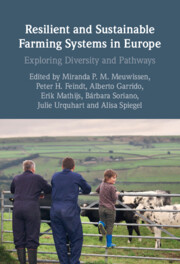This book showcases findings from the SURE-Farm research project which aimed to assess the resilience and sustainability of farming systems in Europe. The call for greater resilience responds to the accumulating economic, environmental, institutional, and social challenges facing Europe’s agriculture. Since the COVID-19 pandemic, the need for enhanced resilience has become an overarching guiding principle of EU policymaking. But what exactly is resilience and how can it be enhanced? How can farming systems prepare for different and often simultaneous types of shocks and stresses, for unexpected and even unknown events?
The chapters in this book distinguish three resilience capacities: for some shocks and stresses robustness (‘bouncing back’) is adequate, but other circumstances require adaptability and transformability (deep learning and change). Putting these capacities at the centre, each chapter addresses key questions such as which characteristics of a system can enhance resilience, whether current governance systems enhance or constrain resilience, and which actors can actually influence and build resilience capacities.
The book is organised in three parts. The first part addresses resilience challenges and strategies for four main processes affecting decision-making in agriculture: risk management, farm demographics including the availability of labour, governance with a focus on EU and local policies, and agricultural practices. The second part portrays the empirical heart of the SURE-Farm project and presents eleven chapters referring to the eleven diverse case studies in the project. Each chapter provides a unique insight into the resilience challenges of Europe’s diverse farming systems and thought-provoking ideas to respond to these. In the third part of the book, findings are synthesised into integrated assessments across case studies, principles to enhance the resilience of farming systems, lessons learned from co-creation processes, and a reflection on the SURE-Farm approach.
Promisingly, the chapters identify various pathways to enhance resilience. However, many of the suggestions require substantial change compared to current practices and policies. For instance, current resilience strategies are often geared too much towards increasing the profitability of farming systems and tend to neglect the coupling of agricultural production with local institutions, natural resources, and a facilitating infrastructure for innovation. Also, current policies are not sufficiently balanced in their support for robustness, adaptability, and transformability of Europe’s farming systems.
Yet, there are reasons for optimism. First, the chapters express much spirit for change – and calls for more long-term vision and courage. Second, the systematic analysis of the multiple components contributing to resilience enables the development of a better understanding of processes of change in agri-food systems, the need to develop greater resilience in Europe’s farming systems, and the priority areas to be addressed.
We wish you an inspiring read.

